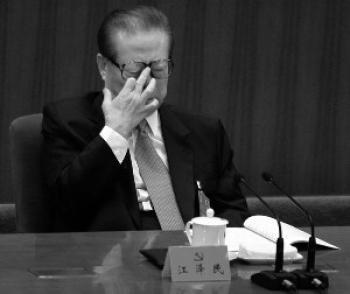In photographs of Chinese leaders taken during the National Day celebrations two weeks ago, former regime leader Jiang Zemin was pictured standing next to current head Hu Jintao, which violates the unspoken rules of Chinese communist hierarchy.
According to Chinese Communist Party (CCP) protocol, one’s standing position should match one’s rank. Jiang holds no current post, yet his presence in the photos is inexplicable, according to observers.
“I think Jiang’s act is very shameless,” said Liu Guohua, vice-president of the Committee to Safeguard American Values, a New York-based monitor of CCP activities.
Jiang took Premier Wen Jiabao’s position, forcing Wen to stand in the next spot. Where Wen stood was equal in rank to Wu Bangguo, chairman of the Standing Committee of the National People’s Congress, who stood on Hu’s other side.
“By sticking himself there, he wants to preserve and remind others of his influence,” he said. “Yet at the same time, the incident reveals that Jiang does not follow rules, not even the CCP’s own rules. His act may have an opposite effect, namely inciting the public to defame him further.”
Jiang left office in 2003, handing the chairmanship to fourth generation leader, Hu.
“He stepped down unwillingly,” said Liu. “Yet he did not have a choice. He smudged the Party’s image quite severely, particularly with his persecuting of Falun Gong.”
“Nowadays, Jiang Zemin does not even dare to leave China, since many Western countries have sued him for his human rights violations.”
Jiang retains strong ties to the military even after his official departure.
According to a November 2006 report in Trend magazine, Hu nearly died in an attempted assassination when he secretly visited a navy base in Qingdao, Shangdong Province in May 2006.
The report is difficult to verify, but circumstantial evidence continues to surface supporting the speculation; such as Hu’s removing almost all officials in Qingdao, sacking Deputy Navy General Commander Wang Shouye, and releasing from jail Jiang’s deadly enemy Chen Xitong.
In 2006, on the pretext of fighting corruption, Hu Jintao moved quickly to clean up the Shanghai gang, Jiang’s power group, including arresting Chen Liangyu, the party chief of Shanghai and more than 50 government officials and businessmen. China experts believe the unsuccessful assassination was the cause, and that the incidents revealed the deepening factional war between Hu and Jiang Zemin.
Hu moved again in early 2007, taking advantage of a social security funds embezzlement case in Shanghai to remove Huang Ju, a member on the Standing Committee of the Politburo, spearheading his move directly toward Jiang Zemin, his sons, and Jia Qinglin another politburo standing committee member.
Liu said that even at home, Jiang is detested by Chinese citizens for giving away land to Russia and having affairs with various celebrities. There have even been campaigns where people printed his picture to publicly stomp on it.
“With an unwillingness to disappear from major CCP decisions, Jiang had to appear on Tiananmen Square at such a time to reinforce his influence,” said Liu, “especially with the upcoming 18th National Congress of the Communist Party of China in 2012.”
According to Chinese Communist Party (CCP) protocol, one’s standing position should match one’s rank. Jiang holds no current post, yet his presence in the photos is inexplicable, according to observers.
“I think Jiang’s act is very shameless,” said Liu Guohua, vice-president of the Committee to Safeguard American Values, a New York-based monitor of CCP activities.
Jiang took Premier Wen Jiabao’s position, forcing Wen to stand in the next spot. Where Wen stood was equal in rank to Wu Bangguo, chairman of the Standing Committee of the National People’s Congress, who stood on Hu’s other side.
“By sticking himself there, he wants to preserve and remind others of his influence,” he said. “Yet at the same time, the incident reveals that Jiang does not follow rules, not even the CCP’s own rules. His act may have an opposite effect, namely inciting the public to defame him further.”
Jiang left office in 2003, handing the chairmanship to fourth generation leader, Hu.
“He stepped down unwillingly,” said Liu. “Yet he did not have a choice. He smudged the Party’s image quite severely, particularly with his persecuting of Falun Gong.”
“Nowadays, Jiang Zemin does not even dare to leave China, since many Western countries have sued him for his human rights violations.”
Jiang retains strong ties to the military even after his official departure.
According to a November 2006 report in Trend magazine, Hu nearly died in an attempted assassination when he secretly visited a navy base in Qingdao, Shangdong Province in May 2006.
The report is difficult to verify, but circumstantial evidence continues to surface supporting the speculation; such as Hu’s removing almost all officials in Qingdao, sacking Deputy Navy General Commander Wang Shouye, and releasing from jail Jiang’s deadly enemy Chen Xitong.
In 2006, on the pretext of fighting corruption, Hu Jintao moved quickly to clean up the Shanghai gang, Jiang’s power group, including arresting Chen Liangyu, the party chief of Shanghai and more than 50 government officials and businessmen. China experts believe the unsuccessful assassination was the cause, and that the incidents revealed the deepening factional war between Hu and Jiang Zemin.
Hu moved again in early 2007, taking advantage of a social security funds embezzlement case in Shanghai to remove Huang Ju, a member on the Standing Committee of the Politburo, spearheading his move directly toward Jiang Zemin, his sons, and Jia Qinglin another politburo standing committee member.
Liu said that even at home, Jiang is detested by Chinese citizens for giving away land to Russia and having affairs with various celebrities. There have even been campaigns where people printed his picture to publicly stomp on it.
“With an unwillingness to disappear from major CCP decisions, Jiang had to appear on Tiananmen Square at such a time to reinforce his influence,” said Liu, “especially with the upcoming 18th National Congress of the Communist Party of China in 2012.”




